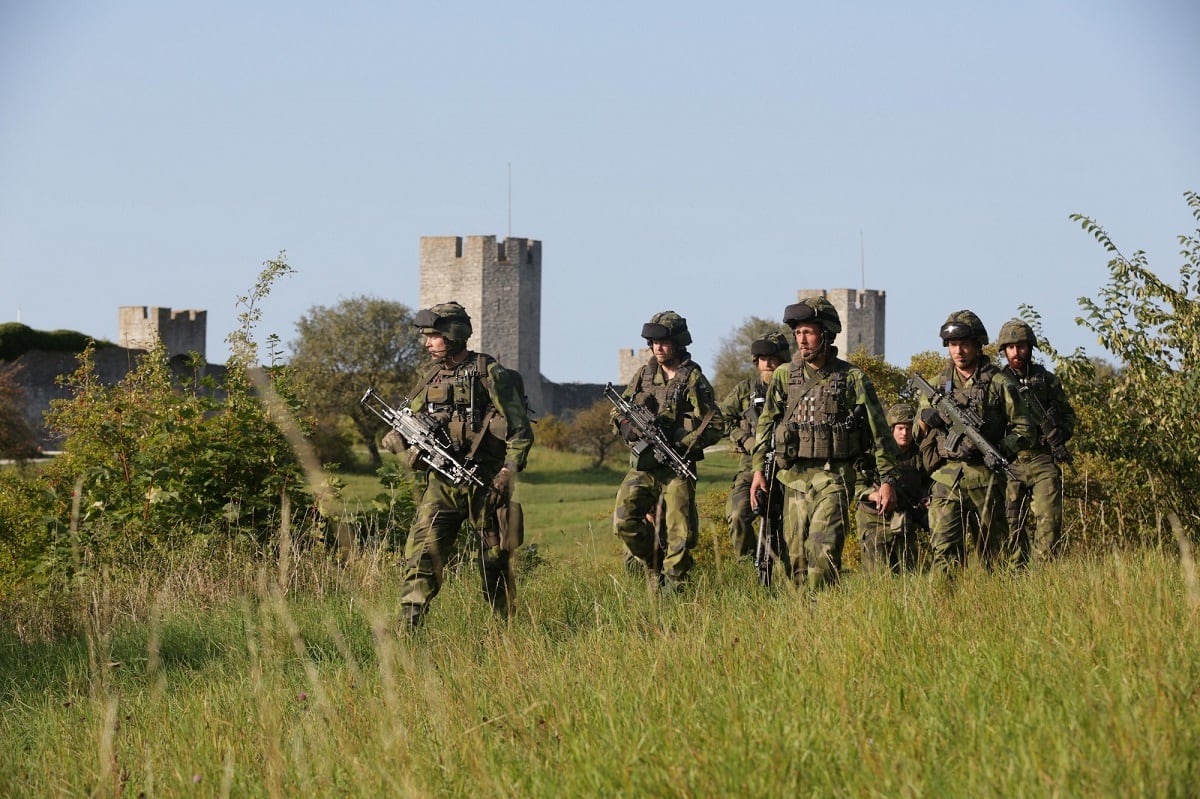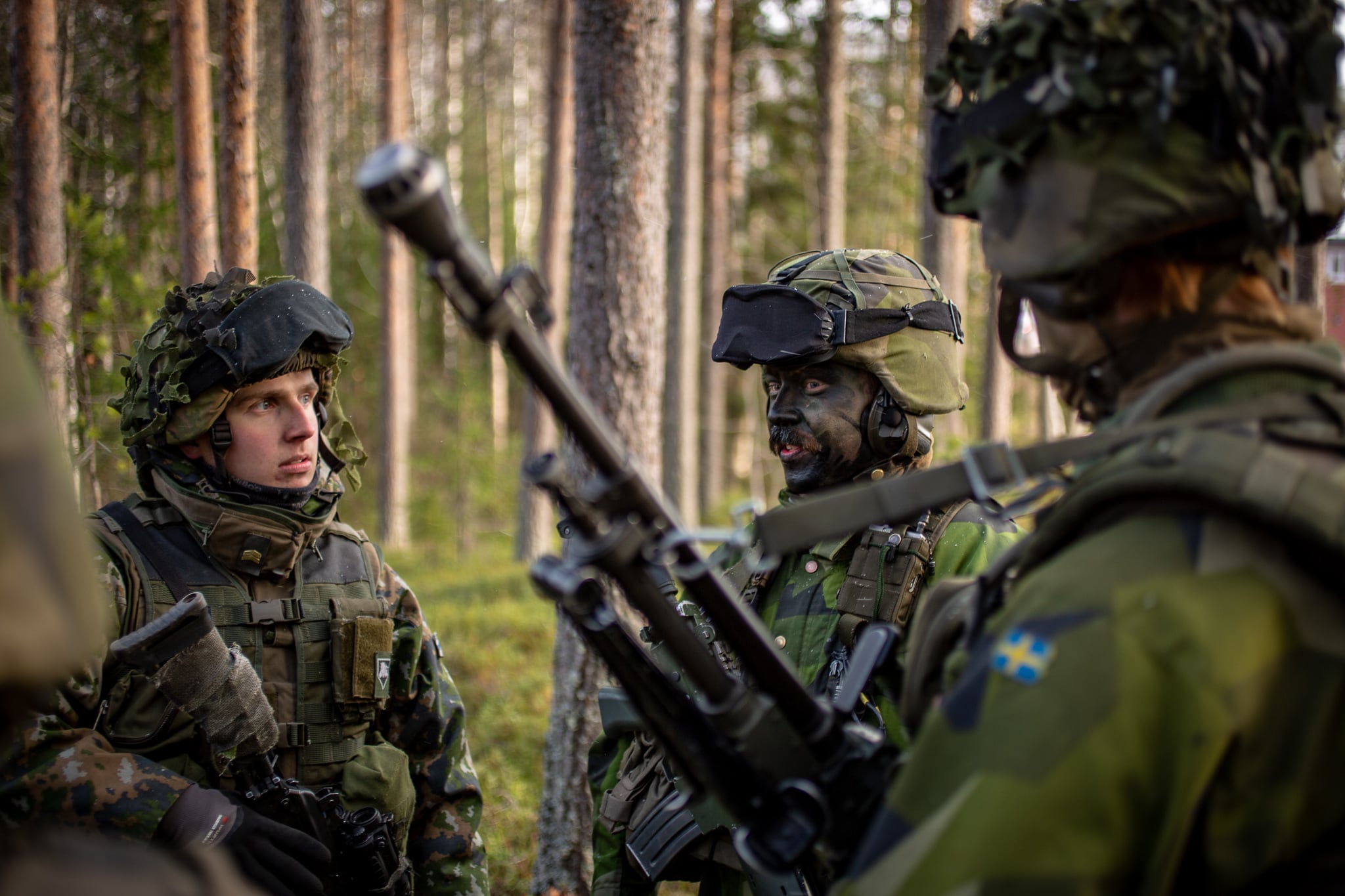WASHINGTON — Though not a NATO member, Sweden is very much in the Western European sphere, as an active member of the European Union and a reliable military partner for the Pentagon. The nation expects to complete a new defense funding agreement in the coming year, which should set the tone for military modernization through 2025.
During a recent visit to Washington, Swedish Defence Minister Peter Hultqvist shared his thoughts on the security situation in the region and what the next few years may bring.
You signed the trilateral agreement with the U.S. and Finland roughly 18 months ago. What has come out of it so far?
It’s a strong platform for the cooperation that we have now and that we’ll have in the future. What we have seen during this time is that we have exercised together, shared information and we are in a development process where we build stability in our part of Europe. It’s very important [to have] U.S. presence in northern Europe because of the security situation and because of what we can see has happened in Russia. We have a history of Russian aggression against Europe, annexation of Crimea, ongoing war in Ukraine and upgrading of Russian military capabilities, and also behavior on the Baltic sea that from time to time we see as provocative.
Finland and Sweden are two nonaligned countries, but we cooperate inside the NATO partnership and we also cooperate directly with different countries on a bilateral and multilateral basis. We both see that the trans-Atlantic link is very important for the stability and threshold in our part of Europe.
Are exercises the biggest deliverable from the agreement?
It’s a combination. Exercises and training is one thing. And exercise and cooperation to create interoperability, possibility of interoperability. When you are planning for exercises like this, you also share information. We have also our own relationship, our own materiel, so there are many things that [impact] each other, so we cannot talk only about one topic.
You mentioned information sharing, which has been a challenge for U.S. partners and allies in the past. How would you characterize info sharing among the three nations?
I think we have a good relationship. From the Swedish side, we have high-level competence about our region, and what has happened in that region. So I think that can be also something that is very interesting for the United States. The information is also connected to what [we are doing].
RELATED

What is your assessment of Russia right now? Same as the last few years, getting calmer or becoming more aggressive?
I can only see that they are ready to use military power to fulfill political goals. That’s No. 1. I also see a development, all these years, that they invest more and more in military capabilities. And I can also see that they exercise and operate in more and more complex levels. And they have an interest in the Arctic region and operate there with their resources they have in the Navy.
What is your impression of the security situation in the Baltics?
I think it’s very, very important for the Baltic states that the [NATO] Enhanced Forward Presence is represented there and working there. I think it’s very important for them, the U.S. participation in these countries. And I think that they also feel the pressure around different sorts of information operations from the Russian side. The threshold is very important for them and it’s very important for all the region because we are all in the same geographical area, and if something happens in the wrong place, it affects all of us.
Many of the nations in the region have talked about a constant barrage of cyberattacks. Where is Sweden on its cyber capabilities?
We are working on that. We have 100,000 activities toward Sweden in the cyber arena each year. That comes from private persons, that comes from organizations and also state actors. It’s authorities, companies, governmental organizations. We [are developing] the organization to defend ourselves. We have a decision in parliament that in the defense forces [we] should develop active cyber.
But more and more we train ourselves to follow all this information operations and disinformation operations, and we are now preparing to build up an authority for local defense, a state authority for local defense.
How much of that mission falls under the Ministry of Defence?
It’s not decided yet. We are only prepared for that. It has not been decided in which ministry that will be responsible. Everything about cyber in defense is under our ministry. We have reactivated conscription service, and some conscripts will do their service in cyber defense.

American officials have raised a number of concerns about the EU’s Permanent Structured Cooperation program, or PESCO, in particular over how it could impact NATO planning and non-EU firms. As a non-NATO country, how do you look at PESCO?
I think that around PESCO we have a very clear position: We say that we do not want any discrimination of companies that are owned by, for example, the U.S. or U.K. interests. We have those sort of companies in Sweden, and we try to fight for regulations that do not discriminate. There is no final solution about how to deal with this in the European Union, but we have our position and we try to get some sort of respect for it. So we are in that process now, but we have no suggestion that we can agree upon, all of us.
How effective are you finding PESCO?
It’s a possibility for different countries and companies to cooperate around material projects that can be useful inside the European Union. I think that can be, from a point of view, good and interesting, but then you need rules. You [should] not have any discrimination of companies that work in different countries for many, many years, and are rooted in these countries and also are part of their defense industry, with direct connection to their own forces in that country.
So from our perspective, we will have no discrimination around this. We are in an early stage. If you want to go somewhere, you must start somewhere, so it is a process we can develop in the coming years.
What are your thoughts on the idea of an EU military force?
We have a agreement between NATO and the EU that we are going to cooperate around hybrid and cyber, and we should be complementary to each other. And I think that is a good agreement, so we have to work from that position. We are not competitors.
Do you think everyone in the EU agrees with that? The idea seems to pop up consistently.
That is the agreement that we have. Form time to time it is popping up that the European Union should build some sort armed forces, but it is not what we have said in the agreement between the countries. So in an open arena you can have your ideas, you can express them. But that is not the same as the organization accepting it. You see these sort of ideas from time to time, but what is agreed upon is that we have to cooperate and be complementary to each other.
RELATED

While the U.S. National Defense Strategy identifies both Russia and China as competitors, the actions and statements of defense officials show a prioritization of dealing with China. Does it make you nervous that the U.S. is shifting focus eastward?
I think we need to handle both of these challenges. I think Russia will not change. It’s very important to uphold the European Union sanctions because of what is happening in Crimea, and to be clear when we see upgrading of their military capability and their activities, I think this is something we have to handle for many years now. So I don’t see any major change in anything. The weapon systems they have equipped last year and in the coming years, it is weapon systems they can use for many, many years in the future. So I think they are upgrading their military capabilities in our part of Europe, and I think what we are doing now with a deeper cooperation between the countries in Scandinavia and the Baltic states and Poland the United States, Great Britain, it is a way to balance and a way to also make the threshold higher. So we must continue with what we are doing today.
But are you worried that the U.S. will shift attention and resources away from Europe and toward the Pacific?
What I know is that there are deliverances from the U.S. side to Europe. New bases there. So today there is deliverance to Europe. From my perspective, I don’t see any debate about if the U.S. is not ready to support Europe because what we see until now and also we see in the plans for the future, we see deliverances. You can always discuss different sort of levels and everything, but I see the relationship with the Pentagon, the armed forces of the United States — we see deliverances.
Looking to 2020, are there any major milestones or issues for Swedish defense on which you need to keep an eye?
I think it’s very important for us to get an agreement and decision about defense, a defense decision, for 2021 until 2025. We have also a big amount of money for that. So I think we can have a defense decision that guarantees developing new military capability between 2021 and 2025, and we will be better in 2025 than we were in 2020, and in 2020 we are better than we were in 2015. So we are in a trend of upgrading military capability, and we are ready to invest in that.
What are those investment priorities?
I think we need a bigger organization, we need more soldiers in the Army, for example. We also have technological challenges [around cyber], and soon we enter a new generation of Gripen, deliverances of new submarines, deliverance of the Patriot system. We need to have more conscripts, we need to develop the brigades in the Swedish Armed Forces, we need to invest more in the island of Gotland.
Gotland has been a focus for a few years. How is that development going?
We’ve taken the first step. We have inaugurated a regiment there, and it’s a mechanized company, a tank company, air defense capabilities. I think we need to invest more and develop that. That’s very important because the island of Gotland is very central from a military [perspective].
Aaron Mehta was deputy editor and senior Pentagon correspondent for Defense News, covering policy, strategy and acquisition at the highest levels of the Defense Department and its international partners.








